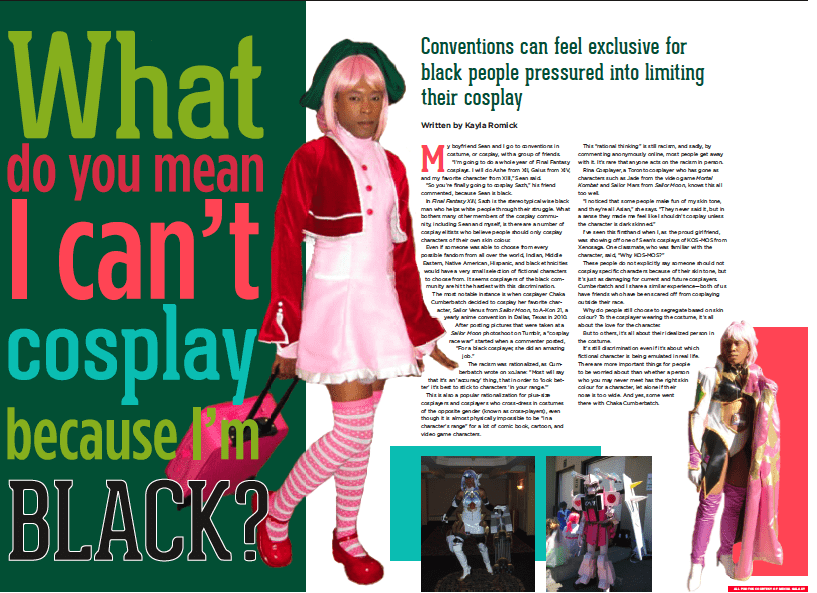My boyfriend Sean and I go to conventions in costume, or cosplay, with a group of friends.
“I’m going to do a whole year of Final Fantasy cosplays. I will do Ashe from XII, Gaius from XIV, and my favorite character from XIII,” Sean said.
“So you’re finally going to cosplay Sazh,” his friend commented, because Sean is black.
In Final Fantasy XIII, Sazh is the stereotypical wise black man who helps white people through their struggle. What bothers many other members of the cosplay community, including Sean and myself, is there are a number of cosplay elitists who believe people should only cosplay characters of their own skin colour.
Even if someone was able to choose from every possible fandom from all over the world, Indian, Middle Eastern, Native American, Hispanic, and black ethnicities would have a very small selection of fictional characters to choose from. It seems cosplayers of the black community are hit the hardest with this discrimination.
The most notable instance is when cosplayer Chaka Cumberbatch decided to cosplay her favorite character, Sailor Venus from Sailor Moon, to A-Kon 21, a yearly anime convention in Dallas, Texas in 2010.
After posting pictures that were taken at a Sailor Moon photoshoot on Tumblr, a “cosplay race war” started when a commenter posted, “For a black cosplayer, she did an amazing job.”
The racism was rationalized, as Cumberbatch wrote on xoJane: “Most will say that it’s an ‘accuracy’ thing, that in order to ‘look better’ it’s best to stick to characters ‘in your range.’”
This is also a popular rationalization for plus-size cosplayers and cosplayers who cross-dress in costumes of the opposite gender (known as cross-players), even though it is almost physically impossible to be “in a character’s range” for a lot of comic book, cartoon, and video game characters.
This “rational thinking” is still racism, and sadly, by commenting anonymously online, most people get away with it. It’s rare that anyone acts on the racism in person.
Rina Cosplayer, a Toronto cosplayer who has gone as characters such as Jade from the video game Mortal Kombat and Sailor Mars from Sailor Moon, knows this all too well.
“I noticed that some people make fun of my skin tone, and they’re all Asian,” she says. “They never said it, but in a sense they made me feel like I shouldn’t cosplay unless the character is dark skinned.”
I’ve seen this firsthand when I, as the proud girlfriend, was showing off one of Sean’s cosplays of KOS-MOS from Xenosaga. One classmate, who was familiar with the character, said, “Why KOS-MOS?”
These people do not explicitly say someone should not cosplay specific characters because of their skin tone, but it’s just as damaging for current and future cosplayers.
Cumberbatch and I share a similar experience—both of us have friends who have been scared off from cosplaying outside their race.
Why do people still choose to segregate based on skincolour? To the cosplayer wearing the costume, it’s all about the love for the character.
But to others, it’s all about their idealized person in the costume.
It’s still discrimination even if it’s about which fictional character is being emulated in real life. There are more important things for people to be worried about than whether a person who you may never meet has the right skin colour for a character, let alone if their nose is too wide. And yes, some went there with Chaka Cumberbatch.
Kayla Romick
Contributor


